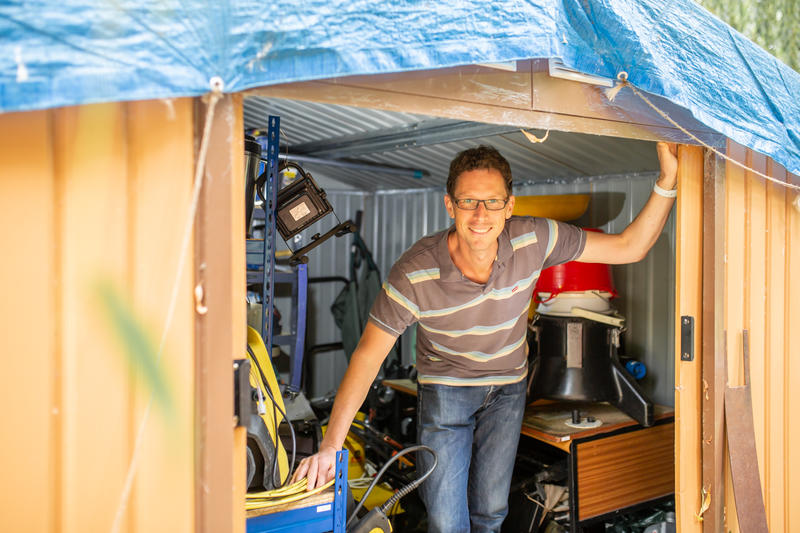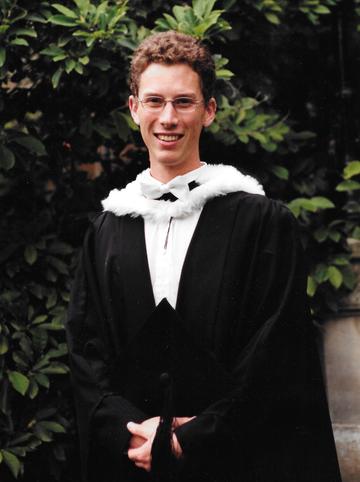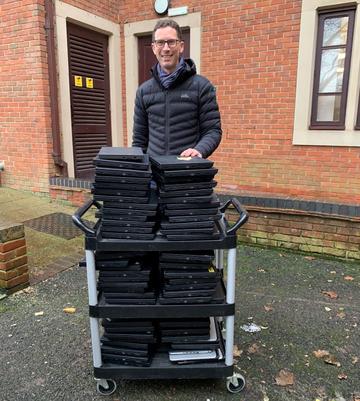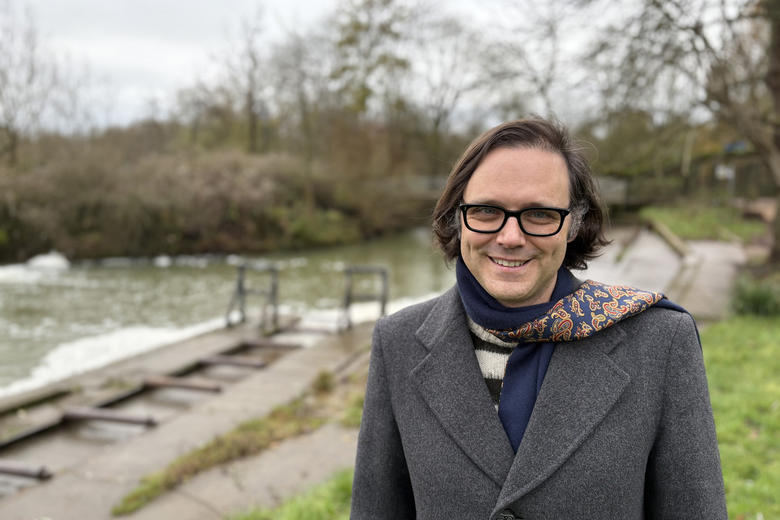ALUMNI STORIES: 'CONNECTING WITH OTHERS IS A GREAT WAY TO HAVE BIGGER IMPACT THAN YOU CAN ALONE'

ALUMNI STORIES: 'CONNECTING WITH OTHERS IS A GREAT WAY TO HAVE BIGGER IMPACT THAN YOU CAN ALONE'
Business Leader Ben Tuppen (Balliol, 1998) talks about leading community and sustainability charity projects and his OxCAN Trustee role.
Published: 3 May 2023
Author: Zoe Burns
Share this article
Tell us about your journey to where you are today?

I studied Engineering at Balliol, matriculating in 1998. From here I took a consultancy role at Detica, now part of BAE Systems, and ended up working with the MoD. Having decided this wasn’t for me, I went travelling, volunteering with Raleigh International, where I was very inspired by their approach to personal development. Upon my return, I discovered Innocent drinks, a really fun and exciting place to work in logistics as we scaled up fast from 2005-2012.
When the time came that I wanted to leave London, my growing interest in sustainability took me to a role at Daylesford Organic, setting up and running their Supply Chain. I loved learning more about farming and artisan food production and am a firm convert to Organic.
In 2016 I took an opportunity to lead an organisation, as Commercial Director at Garden Trading. I enjoyed developing the team and learning more about the customer-facing side of business. When this role ended in April 2020, I was keen to learn more about climate and sustainability and the pandemic also made me more interested in charity work. I came across the fantastic Oxford School of Climate Change set up by the students of Oxford Climate Society. I recommend it to anyone as one of the best ways to spend £10! From here I’ve got involved in local circular economy and charity projects as well as a spell managing Oxford Climate Alumni Network.
How did your time at Oxford change you?
I found my studies at Oxford incredibly challenging, and was pushed on by knowing how lucky I’d been to get there and what an opportunity it was (as well as by some great support from friends and family). This sense that, with support, you can overcome seemingly impossible challenges, has stuck with me. I have a passion for helping others to develop themselves, and take great joy in seeing people achieve more than they thought possible, especially together as a team.
Oxford also had this sense of being at the 'top table', with so many leaders as alumni. I remember a talk at one alumni gathering from a fellow student now a successful celebrity, who essentially pointed out 'if these people around me, who are all just human too, can become the best, then I can do amazing things too'.
What do you love most about Oxford?
I loved the practical elements of my course, especially being able to see the link between the basics we were learning and the cutting-edge work being done at the University. Twenty years on, the computer vision and medical imaging has come mainstream, and the OLED screen that researchers had shoehorned into a Nokia 3210 has evolved into the beautiful display on my iPhone.
The friends I made were of course the number one highlight of my time at the University, and beyond late-night chats over tea, sweaty drinks in the bar or trying not to hit anyone with my long limbs on the dance floor at bops, I loved getting involved in choir, the wind orchestra and rowing.
Tell us about how you came to set up Oxford IT Bank. What are the aims of Oxford IT Bank?
In January 2021’s lockdown, the news was detailing how many children were unable to access school remotely. A friend in my WhatsApp group challenged us to find 50 laptops to donate to Rose Hill primary. As I am confident with this sort of IT, it seemed a great thing to spend time on when stuck at home, so I put out requests for donations and of course started hearing more and more from groups who needed help.
I felt this was something worth keeping going, so asked some friends to help as Trustees and set up Oxford IT Bank. We started taking donated IT, securely wiping it, refurbishing and providing it to organisations helping those in need. Through work supporting refugees with Asylum Welcome I was introduced to the team running Getting Oxfordshire Online, a collaboration of local charities doing this same work. I now have a paid part-time role leading the programme and we are in the process of wrapping the IT Bank into it.
What would your advice be to anyone else thinking about setting up a charity?
I was surprised how easy it was to set up a charity, using the relatively new 'CIO' (Charitable Incorporated Organisation) model. The paperwork is really not much more complicated than setting up a business, and if you are serious about non-profit, delivering impact and demonstrating values, it is all documentation you will need anyway.
I hope these tips are useful as some of the lessons I learned on the way!
- A board of Trustees who share your vision will be an essential support to get going. Don’t make the mistake I did of trying to be both Trustee and charity leader, as this can constrain you if, for example, you decide to commit more time and seek a salary.
- Reach out to find others locally working in this space who could offer specific advice for what you’re trying to do. Two or three serendipitous conversations were crucial to me getting advice on setup, access to my first funds, and links to the community working on the same projects as me.
- I’ve found that paid staff and resources and voluntary and donated play two distinct parts. Raise money to pay where you need consistency, compliance and scalability, and seek voluntary support where you can be more flexible and want to engage your community.
- Fundraising takes time, and some of the most valuable advice has been to 'friendraise' first and the funds will follow. Start with small projects that demonstrate what you’re trying to do, to build a community of support and these people will be by your side when you want to take bigger steps.
What are you working on at the moment?

Having started down a few different tracks and spread myself thin, I’m now choosing priorities. It’s tough to step back from interesting work and say goodbye to great people I’ve been working with, but I’m excited about focusing on work which I feel suits me best. I’m aiming for half-time each on these two projects:
- Getting Oxfordshire Online is all about helping people access our increasingly online world. We refurbish donated laptops, phones and tablets, work with the Telecomms companies to provide free SIM cards, and run a volunteer network of IT support people. There is some great work going on nationally, and we feel that Oxfordshire is leading the way on this practical level of getting kit to people and helping them transform their lives.
- SHARE Oxford is a community group dedicated to reducing consumption and waste. We run a library of things, repair cafés and find good homes for donated items. The project has been running since 2019 and I took over as manager in 2021. We’re working to be an inspiring alternative to buying new stuff and chucking what you no longer want.
How did your work with Daylesford and Innocent lead to your move into sustainability and action on net zero.
Innocent were very impressive in how they managed and communicated their vision, mission and values, and how they developed this as they scaled. Sustainability was always a priority, and Supply Chain is a great way to make a difference or see what other teams were achieving. From helping Spanish strawberry farmers reduce water usage by 90%, to overcoming the technical challenges of recycled plastic in our bottles, to the technology to squeeze every last drop of smoothie out of the pipework at the factory.
At Daylesford, I was introduced to both agriculture and retail. I was inspired by the farming team at Daylesford who explained how their change to organic and 'investing in the soil' had delivered visible sustainability and animal welfare gains, and also commercial gains as land became more productive. On the retail side it was great to learn about the pressures of working with the customer and how dedicated and agile the team had to be to minimise waste (although I was always thrilled if there were any triple-choc cookies available for staff at the end of the day).
As I’ve become aware of the urgent need to move away from fossil fuels, my experience has given me confidence that there is plenty we can do already. Seeing all the hard work people do to make change in jobs which aren’t necessarily 'green-titled', is a source of inspiration and optimism.
If you could change just three things to improve sustainability in the food industry, what would they be?
- I would promote organic products and those supporting regenerative growing. I see improving soil health as one of the great opportunities of the 21st century, and an area where personal buying choices can have a big impact.
- I would love to see our Western food culture move away from innovative processed, convenience foods to a celebration of good growing techniques and seasonal cooking and eating.
- I’m excited by all the schemes reducing food waste, everything from reducing disposable food packaging, to eating more seasonally, to distributing excess at the end of the day, to reducing in-store promotions that entice us to buy more than we need.
I find it empowering seeing great work being done in all these areas, especially as this is stuff that our personal choices can support.
What are the most effective ways that people can change their food shopping habits to become more sustainable?
It’s obviously very difficult to generalise for different people, but it really does come down to personal choices and priorities with the funds you have available.
I would say, if you can, choose organic, buy ingredients and make your meals yourself so you know what’s in them, and investigate how you can get involved in local waste reduction schemes.
You have chosen to use your skills to help others. How would you encourage Oxford alumni to equally apply their skills and experience to the charity sector or volunteering?
It’s been fascinating to learn more about the world of volunteering since making this career change. Particularly with all the change since coming out of COVID, I’ve seen lots of people, including me, overestimating how much time they can commit to a good cause. If you’re keen to help out, I’d recommend:
- Get in touch with local organisations doing things you care about - stop by for a chat, look out for meetings, sign up for newsletters, and get a feel for what they do and how you could help.
- If you’re interested to volunteer, start small. Organisations are often very grateful for help for just a couple of Saturdays a year, spreading the word when you have free time, or a one-off networking conversation.
- If you are short of time, don’t forget that financial support can also be hugely impactful.
How, and why, did you become an OxCAN Trustee?
I came across the OxCAN launch events in September 2020 during the online Meeting Minds weekend. Oxford Climate Society had set up an alumni network and put out a call for members. In March 2021 they asked for volunteers to take on nine committee posts, and I applied to be Director as I thought it would be a great way to meet people and learn more about work on climate. When the network was approved by the Charity Commission in Dec 2021 I stayed on as a Trustee.
Why is it so important to connect with others to take action on climate change?
Connecting with others is a great way to have bigger impact than you can alone. OxCAN members value learning from each other, keeping up with the latest climate information, and in particular being able to learn from and discuss issues with a trusted network of peers. Of course, Oxford alumni are ready to challenge each other too!
And if you are working on climate action, collaboration and teamwork is a great way to keep your spirits up, tackle more complexity than you could do on your own, and meet people who share your passion and vision.
What would be your 30 second elevator pitch to encourage alumni to join OxCAN and volunteer their time and experience to take action on climate change?
With climate change a daunting and scary task, it’s easy to become 'paralysed', not sure how to make a difference.
OxCAN is a friendly community brought together by our Oxford connections and our passion for climate change. Join for free at www.oxfordclimatealumni.com/join, to learn from and be inspired by the skills and perspectives in this unique, global community.
Oxford Climate Alumni Network (OxCAN) brings together the unique skills and connections of Oxford University's alumni, students and staff, to accelerate progress on solving the climate crisis. Become a member to connect with others and get the latest climate information, including the world-class research, from Oxford University.
Connect with Ben Tuppen on LinkedIn.















